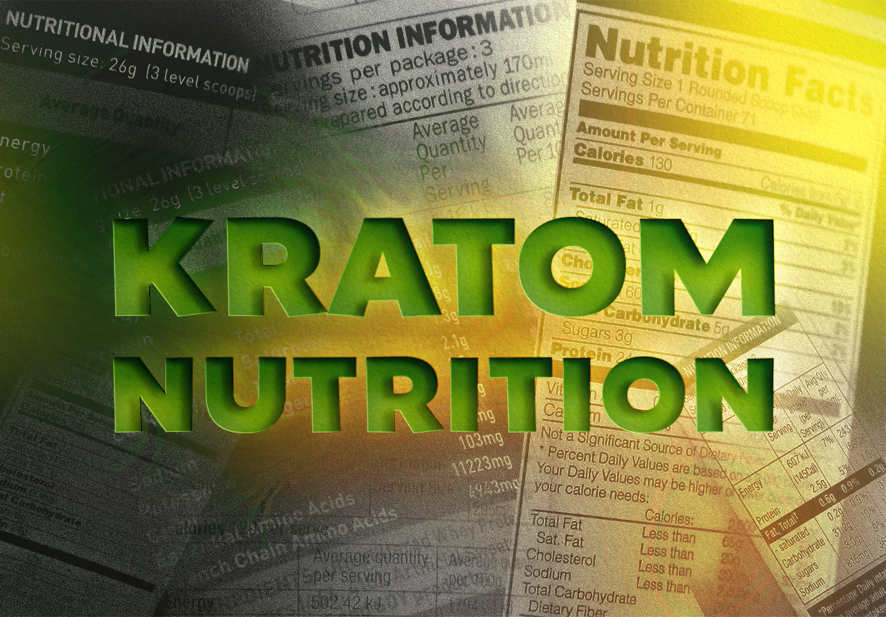
We all know what kratom can do for you — but how does it fit into your diet?
Does kratom have calories? Vitamins? What is the nutritional value of kratom? And does kratom have nutritional benefits to complement its unique effects?
This blog examines all these questions and more, once and for all, making sure that you understand the ins and outs of kratom’s nutrition facts.
Kratom’s Nutritional Profile
Let’s be clear: kratom has not been studied in-depth for its nutritional value. The bulk of kratom research has been focused on its unique effects, its alkaloid composition, and its addiction potential.
That said, we do have rough numbers on kratom’s nutritional profile. Depending on the strain, they look something like this:
Serving size: 2 grams
-
- Iron 0.5 mg
- Protein 0.2g
- Sodium >0.1mg
- Fats >0.1g
- Potassium 18.5mg
- Calcium 13.2 mg
- Carbohydrates 1.5g
- Calories 7.4 kcal
Note that these numbers are approximate and should not be used for diet planning, only for educational purposes.
Kratom’s Nutritional Value: Vitamins, Minerals, and More
We do know something about kratom’s nutritional content. It is a source of nutritional minerals (Calcium, Magnesium, Potassium), a handful of vitamins (such as C and B2), and even antioxidants in the form of polyphenols and flavonoids!
That said, kratom should generally be consumed in small doses, and these nutritional compounds will not suffice for your daily dose! Definitely don’t look to kratom to get your full daily value of Vitamin C — though paired with some OJ for a toss and wash, kratom certainly won’t hurt!
If you’re looking for ways to pair kratom and nutrition, you could also take a look at blending up a tasty kratom smoothie.
Does Kratom Powder Have Calories?
Like virtually anything you take into your body, kratom powder contains calories. However, the number is exceedingly low, and generally won’t affect your diet.
Reportedly, a 2-gram dose of kratom contains approximately 7.4 calories (technically, that’s kilocalories, but that’s what people mean when they say calories anyway!).
Considering that the recommended daily calorie intake is in excess of 1500 calories a day at minimum, that 7.4 extra calories really isn’t going to make a difference.
Does Kratom Have Carbohydrates?
Carbohydrates are one of the three main macronutrients, and they’re an essential part of virtually any diet. That said, for people on low-calorie diets like keto or Atkins, every calorie counts — and excess calories from supplements are to be avoided.
So, does kratom have carbohydrates?
Yes, kratom does have calories. A 2-gram dose of kratom reportedly contains ~1.5 grams of carbohydrates.
BUT! Because those carbs come mainly from indigestible plant fiber, they don’t factor into net carbohydrates, the type of carbs that low-carb diets care about.
As such, kratom’s carbohydrate content is effectively nill, and shouldn’t be a concern even for those on the most strict low-carb diets.
Speaking of carbs from fiber…
Does Kratom Have Fiber?
Fiber, as touched on above, is a type of indigestible carbohydrate. The body can’t absorb it — but it’s an integral part of our diet nonetheless, as it contributes to digestive health, firm and regular *ahem* movements, and a healthy digestive tract.
And yes, kratom does have a small amount of fiber! The ~1.5 grams of carbs in a 2-gram dose are mostly (if not entirely) from plant fiber. Bear in mind, though, that one of the symptoms of kratom misuse is constipation and gastrointestinal distress. If you’re looking for ways to ease an upset stomach and get things “moving” again, kratom may not be the answer if you aren’t used to it yet.
Generally speaking, you should aim for 25-38 grams of fiber per day. So kratom’s roughage isn’t nearly enough on its own — but it’s a healthy step towards getting your daily intake if you know what you’re doing!
Does Kratom Have Vitamins and Minerals?
Vitamins and minerals are micronutrients that are essential for a healthy, well-nourished body. And while kratom contains minimal amounts of certain vitamins and minerals, it’s not enough for you to cut out those daily multivitamins!
There is very little research on kratom’s micronutrient content. So little, in fact, that we’re hesitant to make any claims about it.
That said, similar, better-researched plants contain diverse micronutrient profiles, and it wouldn’t be surprising if kratom contained trace amounts of some of the following:
- Vitamins A, C, E, and K1
- Calcium, potassium, and phosphorus
- Iron, magnesium, and zinc
- Sodium
Again, though, this is speculation. Even if kratom contains all of these, it definitely doesn’t have much of them! As such, keep on keepin’ up with your daily vitamins, mineral supplements, or healthy, nutrient-rich diet!
If you want to ensure that the kratom you’re getting does not contain any extra additives or fillers that you weren’t expecting, be sure to buy it from a reputable source. Kratom Spot relies on 100% transparency with its products, including that all of our kratom products are authentic and GMP-certified by the American Kratom Association. Shop our selection, and find your next favorite today.

